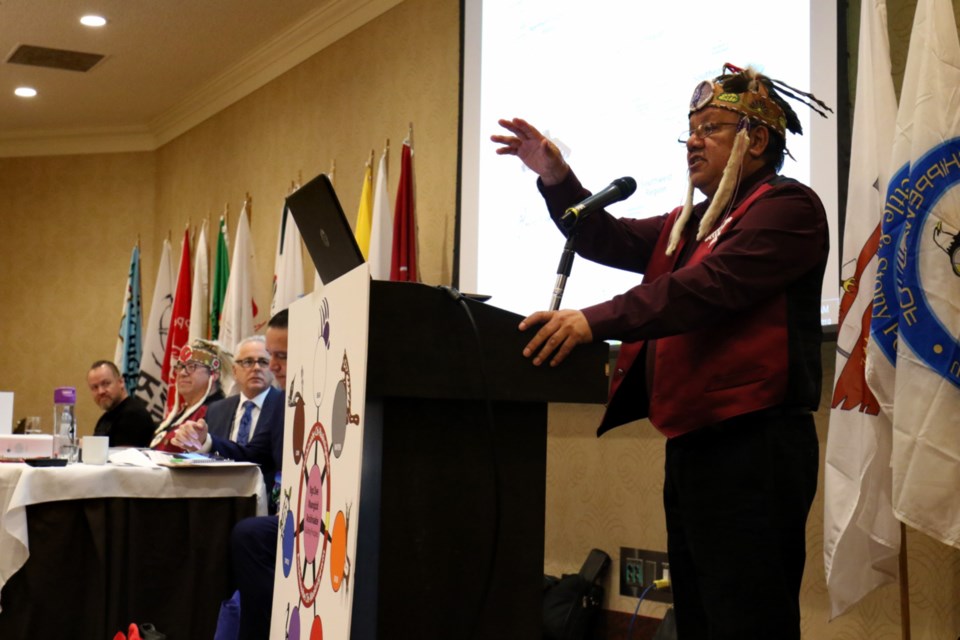The Anishinabek Nation wants to get its membership to endorse a proposed governance agreement with the federal government - one that would see the Anishinabek Nation’s 40 member First Nations across Ontario pass its own laws regarding elections, citizenship, and management.
“We’re trying to get our communities to accept the agreement that’s being worked on, and the bottom line is that we want to control our own destiny, our future, our visions - they’re all in there,” said Anishinabek Grand Council Chief Glen Hare during a governance meeting in Sault Ste. Marie Tuesday. “We say what happens in our communities...no more asking, no more begging.”
Work on the Anishinabek Nation Governance Agreement began more than 20 years ago, when a grand council resolution, mandating negotiations with the federal government, was passed by chiefs in assembly during a membership meeting.
A framework agreement with Canada was subsequently signed in 1998, with an agreement in principle signed off on back in 2007.
Now, the Anishinabek Nation is working with its membership - roughly 60,000 strong, stretching across the province - in order to develop the final text of its governance agreement that will be voted on between August and November of this year.
“It represents the work over 20 years by a lot of people to go out and develop this agreement by input from people - chiefs and councillors and regular folk - to put together this agreement that would see the recognition of our power to pass laws in the area of elections and citizenship, language and culture and management of government-type laws,” said Anishinabek Nation Chief Governance Negotiator Martin Bayer.
The nation-to-nation governance agreement would effectively do away with some elements of the Indian Act, such as parts that deal with elections, band membership lists and how council meetings are carried out.
Bayer says one of the main issues the Anishinabek Nation has with the Indian Act are the current two-year terms for elected band councils.
“We don’t control it, it’s controlled by the federal legislation itself...and one of the particular problematic pieces with the Indian Act is that it’s a very short term of office, so it’s restricted to a two-year term,” Bayer told SooToday. “In fact this year, from between now and November, we’ll see 17 of our communities holding elections - just on account of the Indian Act.”
“So we want to try to have a different process where our people can decide for themselves and through their governments - the First Nation chief and councils - they could decide what would be a more appropriate term of office,” he continued. “That’s one of the things that’s better about this process - it allows our people to have more input into things like how long the chief and council should serve, what the qualifications should be for those that want to seek office on council.”
The draft governance agreement would also allot more money for governance-related functions that would not, according to the Anishinabek Nation, take away from or diminish any Indigenous rights or treaty rights from its citizens.
Hare acknowledges that the negotiation process with the federal government hasn’t always been smooth.
“There’s been some hard meetings, and when we talk about monies and all that, certainly there’s accountability,” he said. “We have what we perceive as a good governance.”
“Sometimes they [federal government] have different answers to that - to explain it and [give] examples,” Hare continued. “No, this is the way we want it - if we do it the way you want us to, it will never succeed with us.”
Now, two decades after the initial framework agreement was signed, the governance agreement is close to being ratified - but so far, the Anishinabek Nation has received just eight band councils resolutions (BCR) supporting the ratification vote for that agreement.
Talks are currently underway with another four Ontario First Nations in hopes of getting more resolutions leading up the scheduled ratification vote this summer.
“It really comes down to the wishes of the chief and council of every one of those 40 communities,” said Bayer. “We’re going to strive to reach out to all 40 right across Ontario in our various regions, so I can’t really prejudge the outcome of that process.”
“We present that information, we talk about how it’s better than what we have now...and then it’s up to the chief and council to decide whether or not they want to pass a BCR (band council resolution) that would authorize the ratification vote in August.”
As the Anishinabek Nation Governance Gathering gets underway in Sault Ste. Marie, Bayer hopes that Anishinabek Nation membership receive enough information over the course of the next three days in order to get a good grasp of the governance agreement.
“It’s an opportunity for people to get together from right across our 40 member First Nations...to learn more specific details about the agreement - what’s in the agreement, what it’s intended to do, how it can make our communities better and stronger,” said Bayer. “It’s really an excellent opportunity for a lot of our folks to gather and really learn more about it.”
